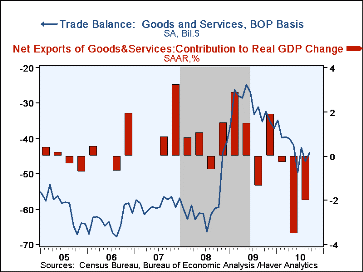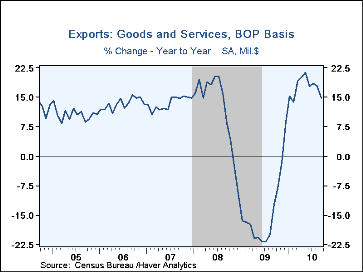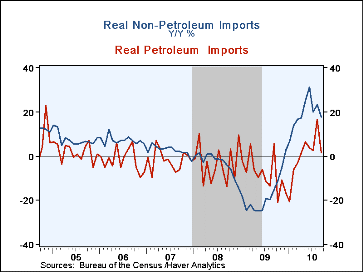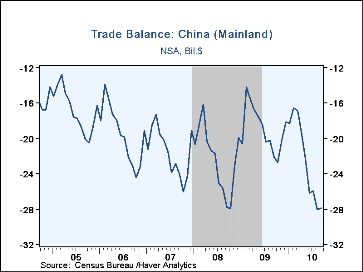 Global| Nov 10 2010
Global| Nov 10 2010U.S. September Trade Deficit Improves
by:Tom Moeller
|in:Economy in Brief
Summary
The September U.S. foreign trade deficit improved to $44.0B following its little-revised deterioration to $46.5B during August. The figure was narrower than expectations for $45.0B. For all of Q3 the deficit averaged $44.4B versus [...]
The September U.S. foreign trade deficit improved to $44.0B following its
little-revised deterioration to $46.5B during August. The figure was narrower
than expectations for $45.0B. For all of Q3 the deficit averaged $44.4B versus
$43.9B during Q2. The September improvement resulted from a 0.3% uptick (14.8%
y/y) in exports and a 1.0% decline (+17.0% y/y) in imports. In constant dollars,
the deficit was roughly stable m/m at $49.9B as exports rose 11.4% y/y and
imports increased 14.5%.
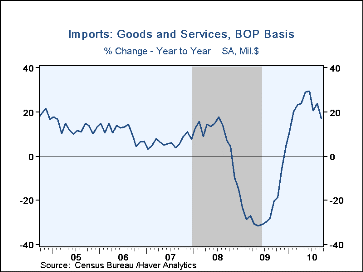
The gain in total, nominal exports was led by an 8.8% jump (38.2% y/y) in "other" exports followed by a 5.1% gain (23.5% y/y) in food & beverages. Exports of nonauto consumer goods rose 1.1% (8.8% y/y) and capital goods exports nudged up 0.7% (15.0% y/y). Exports of commercial aircraft & parts soared by one-third m/m (-15.1% y/y) but that was offset by a 9.9% decline (+21.2% y/y) in computers. Also on the weak side were exports of industrial supplies & materials which fell 2.7% (+18.7% y/y) and autos & parts exports, down 1.4% (+22.05 y/y). The lower value of the dollar continued to encourage visits to the U.S. and pushed up travel exports by 14.8% y/y while passenger fares rose more than one-quarter versus last year. Exports of other private services rose 7.1% versus 2009.
The monthly decline in imports was led by a 6.7% drop in motor vehicles though they still were up by one-quarter y/y. Imports of "other" goods dropped 6.0% (-4.4% y/y) while nonauto consumer goods fell 4.4% (+14.6% y/y) and reversed an August increase. Capital goods imports increased 3.3% (28.1% y/y). The value of all energy-related products fell 8.8% (+7.2% y/y) with lower crude oil prices. The per barrel cost of crude petroleum slipped m/m to $72.36 (+6.1% y/y). The quantity of petroleum imports nudged up just 0.9% y/y. Imports of services gained 0.8% (8.4% y/y) as travel abroad rose 5.8% y/y and passenger fares jumped 15.6% y/y. Other private services imports including education services, financial services, insurance premiums and losses, telecommunications services and business, professional & technical services rose 3.5% y/y.
By country, the trade deficit with mainland China improved slightly to $27.8B. Trade with China surged as exports and imports both jumped by roughly one-quarter versus last year. The trade deficit with Japan improved slightly to $5.0B from its deepest since October 2008. Imports rose by 16.6% y/y with U.S. economic recovery, though that rate of increase slowed, and exports also rose by 12.2%. With the European Union, the trade deficit narrowed sharply to $6.1B as imports increased 12.2% y/y and exports rose a like 12.6%.
The international trade data can be found in Haver's USECON database. Detailed figures are available in the USINT database.
| Foreign Trade | Sept | Aug | Jul | Y/Y | 2009 | 2008 | 2007 |
|---|---|---|---|---|---|---|---|
| U.S. Trade Deficit | $44.0B | $46.5B | $42.6B | $35.2B(9/09) | $374.9B | $698.8B | $702.1B |
| Exports-Goods & Services (m/m) | 0.3% | 0.0% | 2.0% | 14.8% | -14.6% | 11.5% | 13.5% |
| Imports-Goods & Services | -1.0 | 2.0 | -2.1 | 17.0 | -23.3 | 8.0 | 6.3 |
| Petroleum | -0.9 | 3.5 | -0.3 | 7.9 | -44.0 | 37.0 | 9.4 |
| Nonpetroleum | -1.4 | 2.1 | -3.0 | 21.0 | -20.9 | 1.5 | 4.8 |
Tom Moeller
AuthorMore in Author Profile »Prior to joining Haver Analytics in 2000, Mr. Moeller worked as the Economist at Chancellor Capital Management from 1985 to 1999. There, he developed comprehensive economic forecasts and interpreted economic data for equity and fixed income portfolio managers. Also at Chancellor, Mr. Moeller worked as an equity analyst and was responsible for researching and rating companies in the economically sensitive automobile and housing industries for investment in Chancellor’s equity portfolio. Prior to joining Chancellor, Mr. Moeller was an Economist at Citibank from 1979 to 1984. He also analyzed pricing behavior in the metals industry for the Council on Wage and Price Stability in Washington, D.C. In 1999, Mr. Moeller received the award for most accurate forecast from the Forecasters' Club of New York. From 1990 to 1992 he was President of the New York Association for Business Economists. Mr. Moeller earned an M.B.A. in Finance from Fordham University, where he graduated in 1987. He holds a Bachelor of Arts in Economics from George Washington University.
More Economy in Brief
 Global| Feb 05 2026
Global| Feb 05 2026Charts of the Week: Balanced Policy, Resilient Data and AI Narratives
by:Andrew Cates


